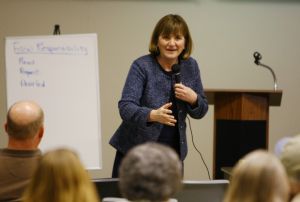LANDER — Wyomingites may one day see a list of cities, towns and counties staff next to their salaries in the local newspaper.
Or maybe not.
On Wednesday morning, the Joint Corporations, Elections and Political Subdivisions Interim Committee discussed Wyoming public notices laws with the press and city and county government associations — those laws that require cities, towns and counties to publish legal notices of minutes of government meetings, and lists of staff positions and salaries.
While municipalities and counties are concerned about the cost of publishing the notices, media representatives touted the paper announcements of public business and offered a possible trade: slackening the public notice law for more clear published notices of public employee pay. The salaries are public under state law, but are printed separately.
Wyomingites care about the legal notices, said Bob Bonnar, president of the Wyoming Press Association, speaking before the lawmakers meeting in Lander. Twenty percent of Wyoming newspaper readers read the legal notices, he said, citing a press association survey. About 60 percent of newspaper readers want legal notices published.
“It’s a lasting record of governmental activity,” said Jim Angell, executive director of the Wyoming Press Association.
The Wyoming County Commissioners Association and the Wyoming Association of Municipalities asked the Legislature if they could study existing public notices laws because it is expensive to pay for legal notices published in newspapers. Technology is changing and many cities and counties could publish legal notices online and save money, said Cindy Delancey, executive director of the county commissioners association.
The press association agreed to help them look at the laws. Legal notices provide newspapers important income, said Bonnar, publisher and editor of the Newcastle News Letter Journal.
Angell said the press association is willing to negotiate on the laws in exchange for a new law that requires cities, towns and counties publish staff names and salaries together.
Current state law requires cities and counties to publish each January and July a list of positions and gross monthly salaries of all employees, excluding names, except in the case of department heads. Each March, cities and counties must publish a list of staff by name and position, excluding salaries.
“The citizens will have everything available and it will be easier,” Angell said of the press association’s desire to have all information published together.
Not on the same page
While the Wyoming County Commissioners Association is open to publishing names, positions and salaries together, the Wyoming Association of Municipalities opposes it.
“The thinking behind this statement is many mayors and councilmen in small municipalities would have to stand up for their employees,” said Barry Cook, who lobbies for the group.
While his organization believes in transparency, “we believe this subjects them to undue criticism and harassment at the local level,” he said.
Lawmakers told the group of press, county and city associations to continue to working out their differences. Committee cochairwoman Rep. Rosie Berger, R-Sheridan, encouraged them to consider publishing the information online since more people turn to the Internet for news.
Legislators also discussed published minutes for meetings.
Sen. John Hines, R-Gillette, said that when he reads a story in a newspaper about a meeting, he learns about people’s objections and discussion of government policy that he rarely reads about in meeting minutes.
John Gibbs, a Johnson County commissioner, said that most minutes don’t include information about when bathroom breaks were taken or even some comments from members of the public that have nothing to do with items on the government body’s agenda.
Rep. James Byrd, D-Cheyenne, said that maybe the state law needs to include guidelines on what should be in meeting minutes so they are uniform.








 Please Wait…
Please Wait…